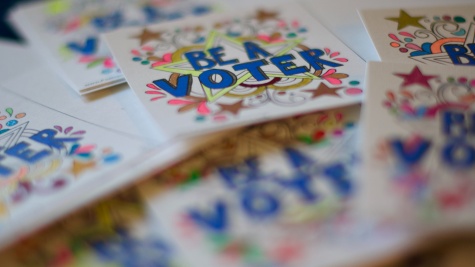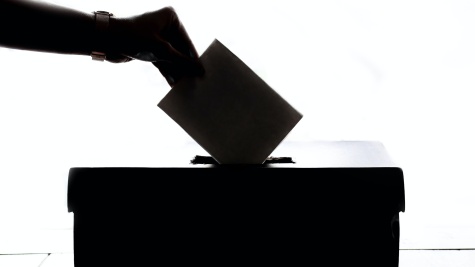Evaluating Practitioner Interventions to Increase Trust in Elections
The MIT Election Data and Science Lab helps highlight new research and interesting ideas in election science, including through research grants under our ongoing Learning from Elections program.
Our post today was written by Jennifer Gaudette, Seth Hill, Thad Kousser, Mackenzie Lockheart, and Mindy Romero, based on their ongoing research funded by this program. The information and opinions expressed in this column represent their own research, and do not necessarily represent the opinions of the MIT Election Lab or MIT.
As distrust in the integrity of American elections has grown and been echoed at the highest levels of American government, election officials across the country have responded with public information campaigns designed to demonstrate why the electoral system should be trusted.
Through television advertisements and social media campaigns, secretaries of state and other officials have explained who administers elections and the steps that they have taken to deliver accurate vote counts and protect integrity. However, many of these practitioners have questioned whether their efforts are actually affecting voters.
We collaborated with elections officials in four states to design survey experiments meant to test whether official informational messages can change Americans’ perspectives on election integrity. Our academic team collaborated with nonpartisan election officials in Texas, Georgia, Colorado, and Los Angeles County to design this survey gauging voter confidence after the 2020 midterm elections and to use experimental methods to test the impact of their public information efforts.
We fielded our survey from November 17-27th, 2022, as soon as control of the House of Representatives had been projected by the Associated Press. After attention check terminations, we ended up with a final national sample of 3,038 respondents, which accurately reflected the eligible voter population in the U.S. We also fielded state- and county-specific samples of at least 1,200 respondents in each of Texas, Georgia, Colorado, and LA County. Respondents were asked a variety of questions about their trust in election administration in their state, in other states, and about specific kinds of electoral fraud.
Our results showed that while Democrats and independents reported higher trust in elections than they did on comparable surveys by Morning Consult conducted prior to the 2022 midterm election, Republicans reported similarly low levels of trust in elections as they did prior to the election. We also found that respondents had significantly more trust in their own state’s election integrity than they did in other states’.
In addition to the battery of questions addressing respondents’ trust in elections, we tested the effects of public information messages produced by election officials in Virginia and Arizona on this national sample. Respondents were randomly assigned to one of two treatment groups, who watched the Virginia or Arizona videos, or a control group, which watched a State Farm insurance commercial. In addition, we tested both the nationally oriented messages and state- and county-specific messages created by election officials.
Each locality-specific group also watched one of two video treatments from their state/county or a commercial that served as a control, and respondents from these locations were again randomly assigned to a treatment or control group. For all samples, respondents were asked a battery of questions about their trust in elections prior to watching videos or answering questions about how they voted, and then were asked an identical battery of questions about trust in elections after watching the videos.
The national treatment videos were viewed by the national sample and respondents from each of TX, GA, CO, and LA County. They consisted of an ad produced by Virginia officials, which introduces elections clerks from all across the state in order to put a human face on those protecting the vote, and an ad produced by Maricopa County officials in Arizona, which provides an in-depth description of the procedures and practices that safeguard election integrity there. We combined the samples together for our initial national treatment effects analysis, for a total of 8,338 respondents from our national, state, and county samples.
Our initial results suggest that these public information videos about election integrity do change people’s minds and increase trust in elections. Watching just one of these messages from election officials had positive, statistically significant (p<0.05) effects on the average respondent. We found that watching one of the national treatment videos resulted in a 2.5 percentage point increase in the probability that a respondent trusts elections in other states “some” or “a lot,” rather than distrusts them “some” or “a lot.” The treatment also led to a 2.9 percentage point increase in the likelihood that a respondent trusted that fraud by election officials “rarely” or “never” occurs.” Unsurprisingly, these videos did not have a significant or meaningful effect on respondents’ trust in their own state’s elections. Importantly, we also found that these videos were no less effective at increasing trust among Republicans than they were among independents and Democrats, indicating that the treatments are not just increasing trust among voters who already hold higher levels of trust in election integrity.
When digging into the individual treatments, we found that the factual treatment generated broader significant effects, with a significant increase in trust in other states, belief that voter fraud is uncommon, and belief that election officials engaging in fraud is uncommon. The emotional appeal also generated significant positive effects on trust in other states and belief in election officials engaging in fraud rarely.
The state-level results also provide more evidence that different kinds of campaigns have different effects. The bipartisan official video that was played in Colorado featured a Republican former Secretary of State and the current Democrat Secretary of State both agreeing that elections were secure. However, this not only had no significant effects, it was the only election official-produced video that elicited negative effects on trust, albeit insignificant negative effects. This suggests that voters do not want to merely be told elections are safe; factual videos explaining why elections are safe and secure by showing the steps election officials go through to secure citizens’ votes are generally the most persuasive to respondents.
The only other video that generated mull effects on respondents’ trust in elections was a get out the vote video for Los Angeles County, which we crafted using GOTV messaging from LA County. These null effects on trust in Los Angeles respondents’ own state elections may result from the fact that the messages did not provide in-depth factual information about the ways in which election integrity are protected. This would suggest that election officials are generally correct in their approach to increasing faith in elections. Most practitioners have focused on providing facts and information about electoral systems to voters, and we found that these kinds of videos appear to be the most persuasive to voters.
Our next steps are to test the treatment effects on respondents who paid the most attention to the videos using our manipulation check questions and time spent on the video page as proxies for paying attention, as well as to test the effects on those who are likely most persuadable (i.e., do not report high levels of trust or distrust in elections). Additionally, we plan to run a second survey experiment based on our findings and feedback from our election official partners.



